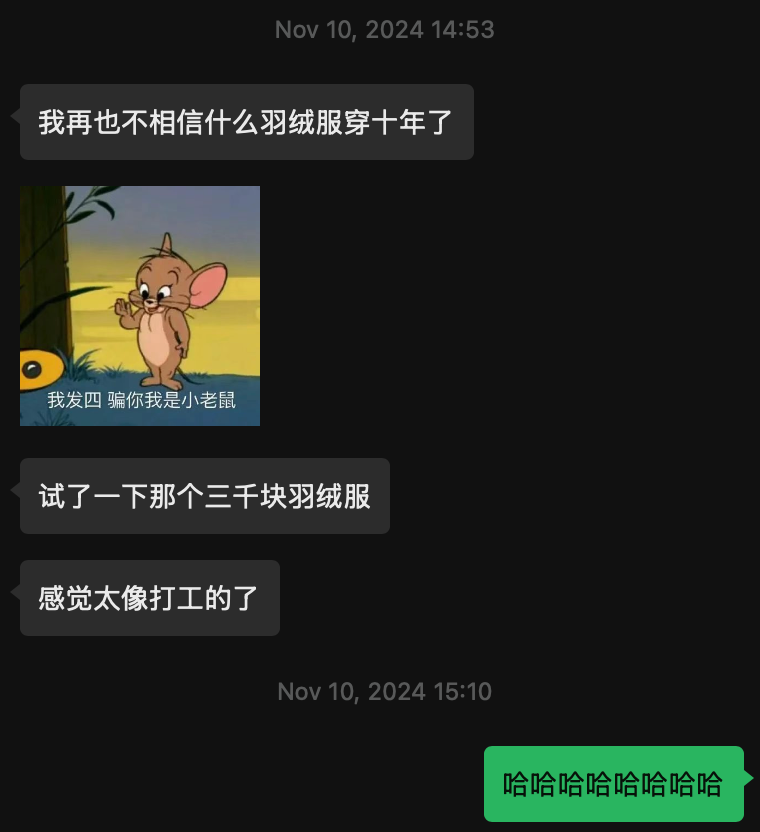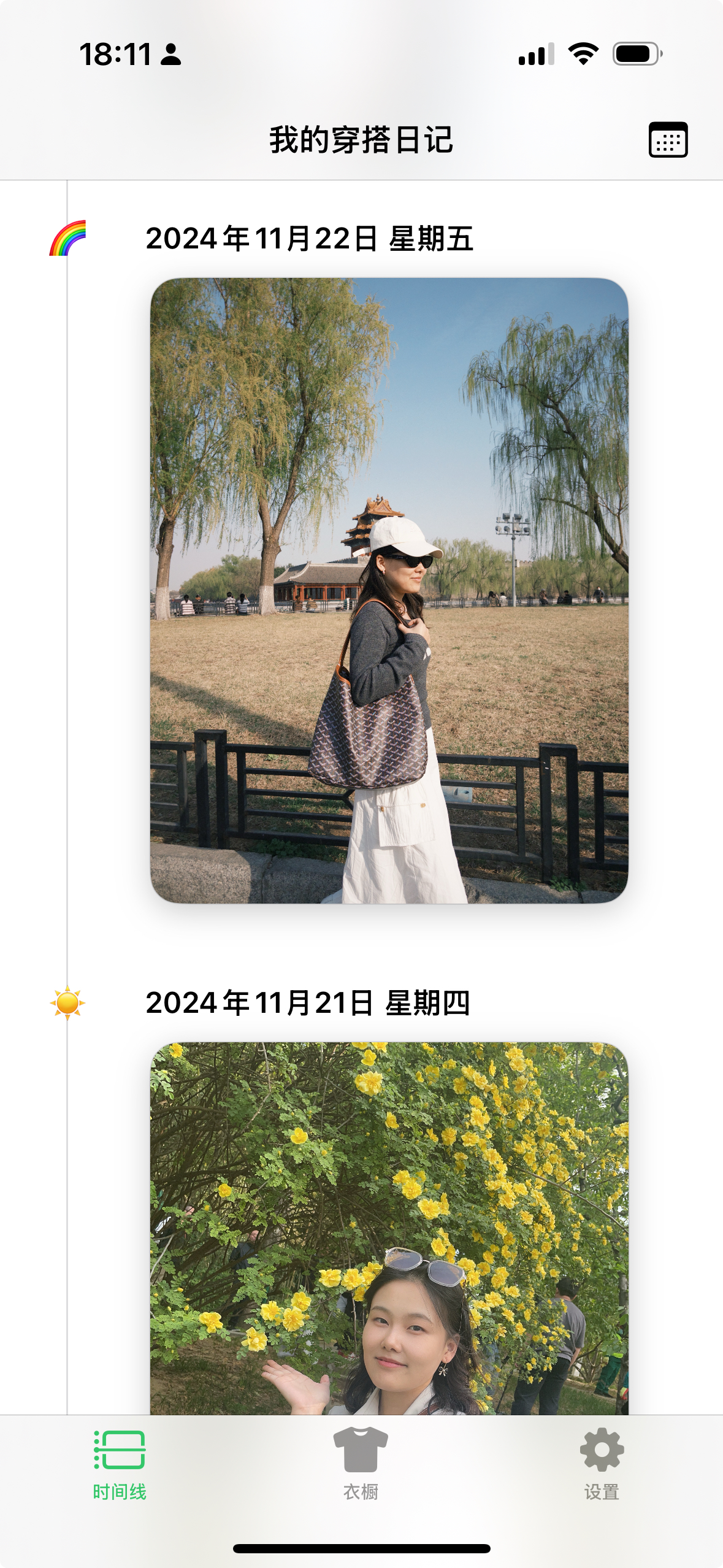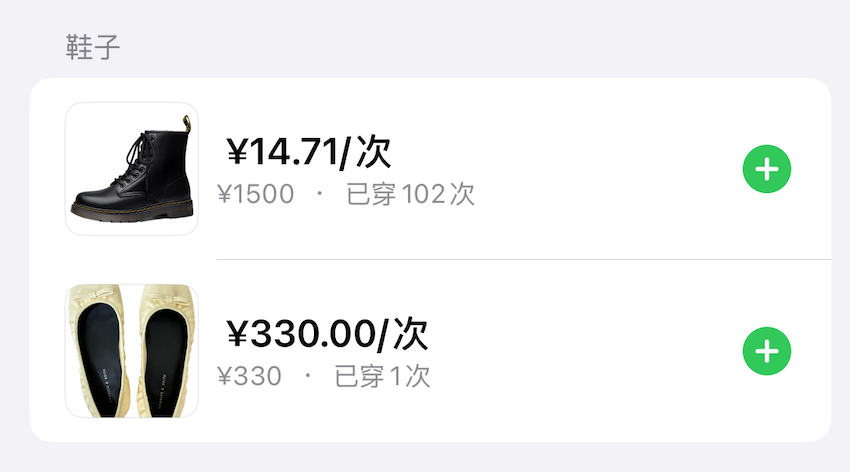The Journey of Development
Recently, I keep seeing posts about "long-termist outfits" on Xiaohongshu. It seems that if a post doesn't have the title or tag of long-termism, it can't be published. At first, I thought it made sense; good and expensive items are always used longer. But is that really the case? Last year, Sister Zhang spent over 3000 on a down jacket, and I asked her if she was really willing to spend that much. She said it was fine; she would wear it for ten years. This year:

And what about my wardrobe? It's not much better. I have skirts that I bought but never took the tags off, which I threw away during a recent decluttering session after two years. I bought shoes that seemed okay at the time, but I was too lazy to shop around, and I ended up wearing them just once. In the end, I couldn't even sell them on Xianyu. Every day, I open my bulging wardrobe but still struggle with what to wear.
Having too many choices is equivalent to having no choice at all.
Because I own too much, I am confused about what I should wear and buy. Only when one is in scarcity can they truly understand what they really need.
So, I started decluttering.
-
Out: Throw away the mediocre clothes
-
The most frustrating part of decluttering is dealing with those clothes that are just "okay" to wear. If a piece of clothing doesn't fit at all, it's easy to discard it. But if it’s just passable, the difficulty of letting go increases dramatically. If that piece of clothing happens to be expensive, it becomes even harder.
-
Does wearing mediocre clothes make one feel excited inside? Does it fill one with confidence for the day? Continuously wearing just okay clothes prevents us from discovering other items that might suit us better. So why do we do this? What is the point? Every day of our lives is so precious!
-
More importantly, these clothes do not provide the satisfaction and joy of "finally getting it," so we quickly move on to the next purchase. In the uncertain anticipation of "maybe the next one will satisfy," we waste money and lose ourselves. Engaging in mindless shopping repeatedly will never lead to genuine satisfaction.
-
Discarding unused items is not regrettable; what’s truly regrettable is buying clothes that we never wear. When we purchase items that we will never use, we have effectively wasted that money. Therefore, whether we hold onto an item for ten years or throw it away three days after buying it, the level of waste is essentially the same.
-
-
In: Only buy clothes that you truly like
- With limited finances, we should only buy what we genuinely want. Experience that joy and cherish using it more. Once you have felt that happiness, you will unconsciously forget about the alternatives.
- But what do I truly like? I follow a long list of fashion bloggers on Xiaohongshu, who push new products for each season. They look really good, and I think, "This is what I like!" But when I buy them, they often turn out to be just okay after trying them on.
- The outfit scenarios set by fashion bloggers are almost completely different from our real-life situations, destinations, and modes of transportation. More importantly, our appearances and body types are different too. So, we can only think for ourselves about what to wear and how to wear it.
- By recording my daily outfits, I gradually discover which clothes truly suit me and which are just for the sake of it.
In this process of discarding and acquiring, I hope to see what truly suits me.
These thoughts drive me every day and prompted me to develop LookLog.
I hope to:
-
Record outfits and find my own style, rather than just following what bloggers say or wear.

-
Track the number of times I wear each item to know which are false bargains and which are true long-term investments.

(These shoes, which I wore only once and then decided to sell on Xianyu, and the expensive but well-worn Martin boots that I've had for two to three years)
Discard clothes that no longer suit you and think carefully before each purchase. If you can stick to this, the image of "that new piece of clothing that suits you" will gradually become clearer. Over time, your wardrobe will only contain clothes that suit you, bringing you closer to the ideal "zero-pressure wardrobe"!
I also tried to find existing apps to start recording, but I was too lazy. Most of the wardrobe apps I tried required logging in or had a bunch of parameters to fill out when entering clothes, which was very unfriendly for a lazy person. So, I decided to develop it myself. Initially, I had a more ideal vision of integrating Taobao's API to directly recognize uploaded clothes, so users wouldn't even have to fill in the price. However, this was a bit too difficult for someone with little development experience like me, and I didn't want to get stuck at the minimum viable product stage. Additionally, integrating third-party APIs would inevitably involve costs, and I didn't want to start paying before I had even added two items. So, I opted for a user manual input for prices. I also used a bit of AI for category recognition, just a little, about 40%, haha.
In short, LookLog can be used without logging in or registering, and all data is completely localized, so there are no privacy concerns.
Adding clothes is also quite simple: input the image -> fill in the price -> save. The background automatically processes the cropping and category recognition with zero delay, and the iOS vision API is quite user-friendly.

Through continuous recording, I hope everyone can find their 30 favorite pieces of clothing, each of which they will wear, love, and find very suitable for themselves.
Every day, we make various choices, from items to clothes to lifestyles. I believe that life is composed of these continuous small choices, and LookLog hopes to be your companion on this path of awareness, helping you find your own "just right."